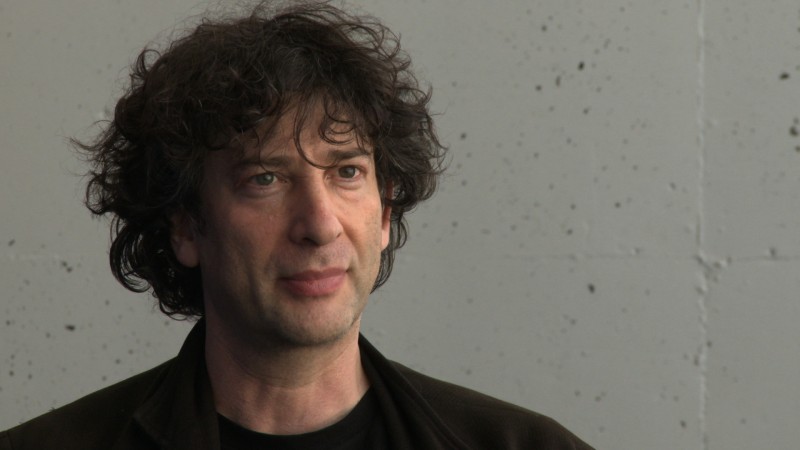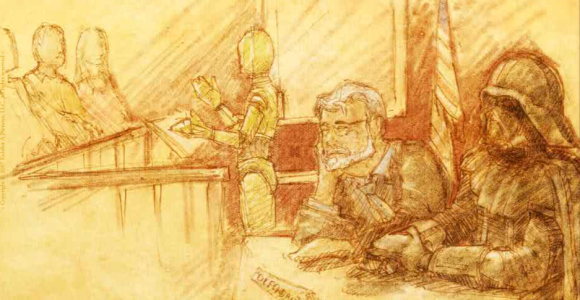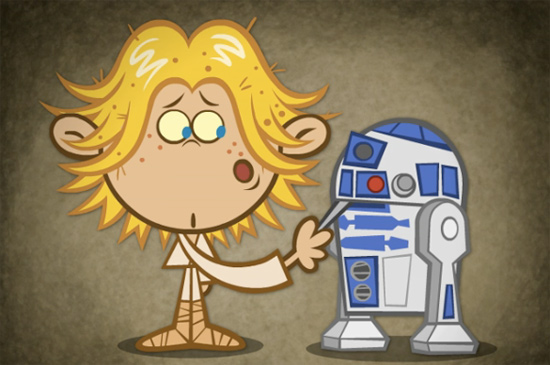Geekscape Movie Reviews: The People vs. George Lucas
I once wrote a brief article on how massive cult science fiction films like “Star Wars” seem to fulfill a religious need in the hearts of sci-fi fans, and how the release of “Star Wars: Episode I – The Phantom Menace” represented a crisis of faith for true believers. It was a short article that read more like the short thesis of a longer essay than an actual complete thought, but I still think there’s something to it. Why else, then, would there have been such an outpouring of vitriol from “Star Wars” fans the world over? Why did the phrase “George Lucas raped my childhood!” enter common parlance? George Lucas owns the rights to his “Star Wars” movies, and may do what he wants with them, but, perhaps, the people who live for the movies – the ones who make fan films, who re-enact the film on YouTube, who re-edit the new “Star Wars” films to their liking, who obsessively collect toys, who have made “Star Wars” into a lifestyle – are the ones who truly “own” “Star Wars.”
Alexandre O. Philippe‘s new documentary “The People vs. George Lucas” is an exhaustive and holistic documentary that should rest near the hearts of all obsessive “Star Wars” fans, as it brings every last issue to light, and interviews scads of nerds, comedians, authors (among then Neil Gaiman), and pop culture experts on the matter (among them, Geekscape’s Jonathan London, a man I occasionally write for), coming to various conclusions, and exactingly examining each pop culture faith crisis that “Star Wars” has presented since 1997, the year the Special Editions were released in theaters.

Why, for instance, did Lucas decide to erase all the hard-wrought practical effects from his 1977 only to replace them with slicker – and perhaps blander – digital effects? Why did he add all the extra visuals? Why does he keep on denying fans access to the original versions on home video? Why has he gone out of his way to suppress the awful “Star Wars Holiday Special?” And what role does Jar-Jar Binks play in all this? Surely Lucas, who hasn’t made many films in his career, has the right to re-tinker his films, but does he have the right to re-write cinema history in such a blatant fashion?

“The People vs. George Lucas” jumps, two feet first, into the maddening ambivalence that surrounds the much maligned George Lucas. Generations of film audiences have sainted him for making “Star Wars,” grew up with the toys, and were welcomed into a marketing glut that the world had never yet seen. Then, once Lucas had become a billionaire, and decided to repackage his films, the fans felt betrayed. Then, when Lucas decided to make a few more “Star Wars” films 22 years after the fact, they were welcomed by fans and critics with horror and disgust. For a generation of near-religious fanatics, this is more than a bad sci-fi film to be dismissed. This is reversing dogmatic decree. Angry fans weigh in, ranting about how they’ve been led on. Other critics do point out how no one forced those kids to buy the “Star Wars” toys. There were even a few words on the curious phenomenon of “Star Wars” fans who have to prove their fandom by exclaiming how much they hate “Star Wars.” Like hipster atheists, with no religious agenda other than an open bone to pick with their previous church, these fans are still mired in “Star Wars” lore, and live to hate it. Maybe they can stray to the dark side, and try out some re-runs of “Star Trek.” Bwa ha ha.
I was surprised, even, to see the suggestion that the new, hated “Star Wars” films are actually having the same effect on children today as the old films had on their parents. Some fans even suggested, wistfully, that perhaps its time to let “Star Wars” go. The most melancholy pieces come from, of all people, Francis Ford Coppola, who remembered George Lucas the maverick filmmaker, who had to work and struggle to get “Star Wars” made, and laments that the overwhelming success of his film, and his sudden wealth only ruined him as an artist, stagnating his career. Coppola and the fans seem to agree: Lucas simply became too large for his own good.
This pop culture struggle has been at the center of the Geek lifestyle since 1977, when geekery really exploded in earnest. A generation (and perhaps a cultural tolerance for arrested adolescence) has now grown up, unshaken, in the cult of “Star Wars,” and they have to star acknowledging, as they age, and as the franchise becomes increasingly moribund, that it may be a thing of the past. In a way, “The People vs. George Lucas” with its open embracing of geek ambivalence toward their geek heroes, may serve as a distant death knell for the geek lifestyle. If we’re growing up, and our old objects of affection are tarnished, are we going to stick around?
Since extensive footage of the “Star Wars” movies was not available, Philippe did the next best thing, and peppered his film with the hundred upon hundreds of fan-made “Star Wars” films in the world. There is, the film points out, something unique about “Star Wars” fans, and their need to re-create the movie in their own idiom. It makes for a saturation of the eyeballs that can be a little overwhelming for the non-”Star Wars” fan, but creates a refreshing and lively variety of visuals. Here’s something curious: for all the rage Lucas has incurred from his own fans, he encourages fan film and re-edits through his own website. This is sporting of him.

The finest review I have seen of this phenomenon was made by Harry S. Plinkett (a.k.a. Mike Stoklasa) of Red Letter Media, who made hysterical and insightful feature-length video reviews of each of the “Star Wars” prequels. If you feel lost on the issue, or don’t know the details, watch these reviews, and you’ll be right on track. For those who do not celebrate the geek lifestyle, or find the entire worship of “star Wars” to be childish, you may want to see the film anyway; it will give you a keen idea on how popular culture seems to move in the information age.
